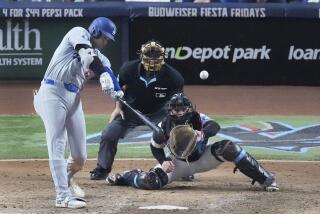Major League Baseball accuses Upper Deck of trademark infringement
- Share via
Major League Baseball Properties Inc. is taking former business partner Upper Deck Co. to court, claiming that the Carslbad trading card maker continued using official logos after a licensing deal had expired.
Major League Baseball Properties, which oversees trademarks for 30 teams, filed a complaint against Upper Deck claiming trademark infringement in New York City federal court Monday.
The lawsuit seeks unspecified damages and calls for Upper Deck to recall its 2009 and 2010 baseball cards, which feature team and league logos.
The league also alleges in its suit that the card company still owes it $2.4 million from the most recent renewal of the licensing deal, which expired last year.
A spokesman for Upper Deck, Terry Melia, said the company had no comment on the suit.
The court filing comes just days after Upper Deck reached a settlement in a suit brought by another former licensing partner, Konami Digital Entertainment Inc. of Redwood City, Calif.
Upper Deck had the rights to distribute Konami’s trading card game, Yu-Gi-Oh, in the United States and Europe, according to the suit. But Konami, which is owned by Konami Corp. in Tokyo, alleged that Upper Deck manufactured thousands of Yu-Gi-Oh cards without permission.
The settlement came on the first day of the trial last week. Most of the terms of the agreement have not been made public.
Yu-Gi-Oh is massively popular, recognized by Guinness World Records as the world’s top-selling card game. Guinness said that 22 billion Yu-Gi-Oh cards have been sold worldwide.
Yu-Gi-Oh cards are used to simulate battles between characters in a popular television series and comics.
Even with the settlement, the two companies continued to trade accusations.
Upper Deck released a statement Friday saying that Konami’s “case was disintegrating” before the trial started. Konami fired back Wednesday, claiming that Upper Deck had been forced to settle after testimony from a former employee depicted a “cover-up” complete with secret meetings. The battle continued as fiercely as any Yu-Gi-Oh game, but with attorneys’ statements rather than cards.
Konami was trying to “avoid the embarrassment of having to settle their case,” said Richard K. Howell, who represented Upper Deck.
Konami’s attorney, Benjamin J. Fox, said it was Upper Deck that folded.
“A Los Angeles federal court found that Upper Deck was making counterfeit Yu-Gi-Oh cards,” he said, referring to a summary judgment in December. “We’re going to let that speak for itself.”
nathan.olivarezgiles
@latimes.com


